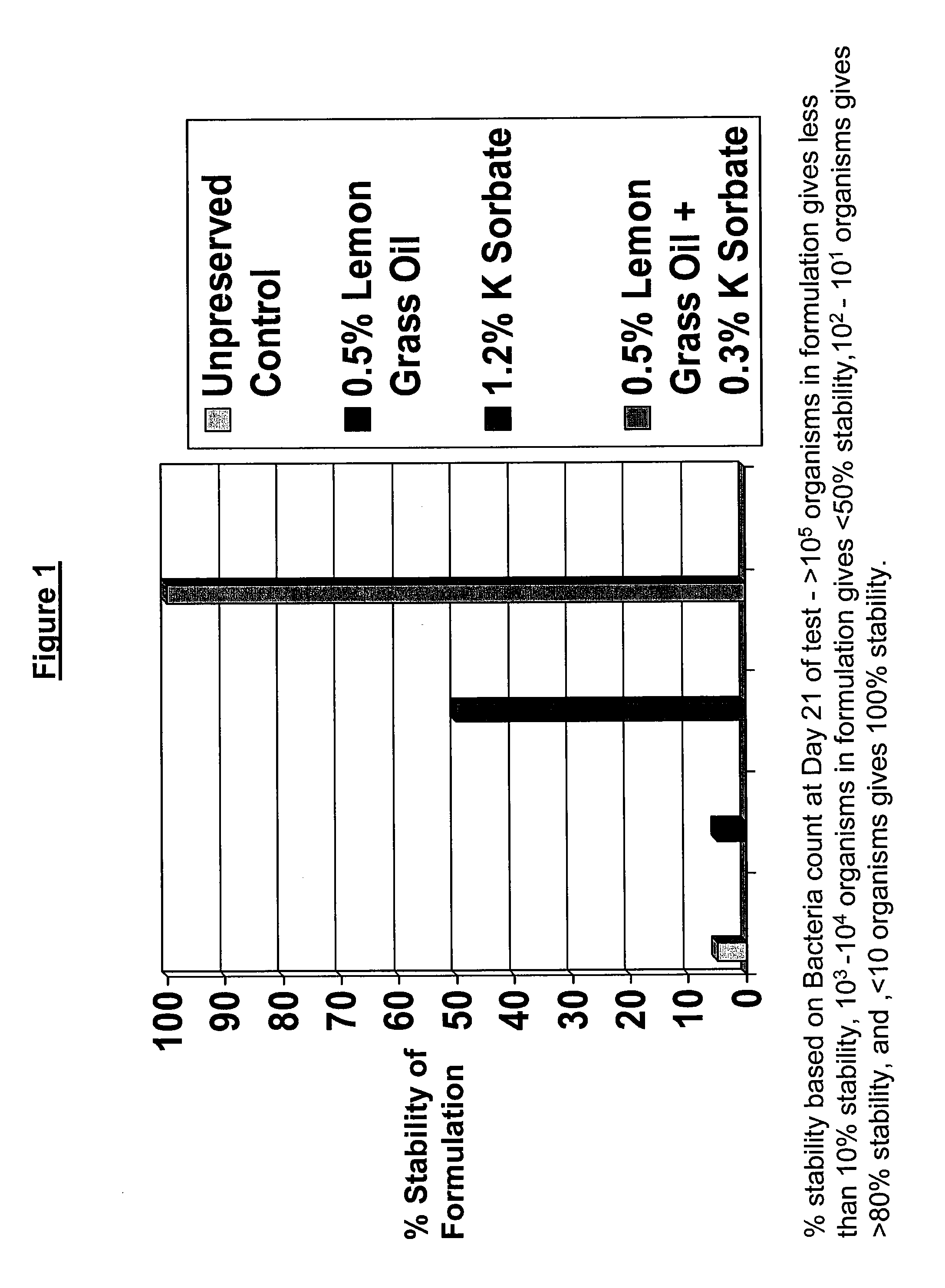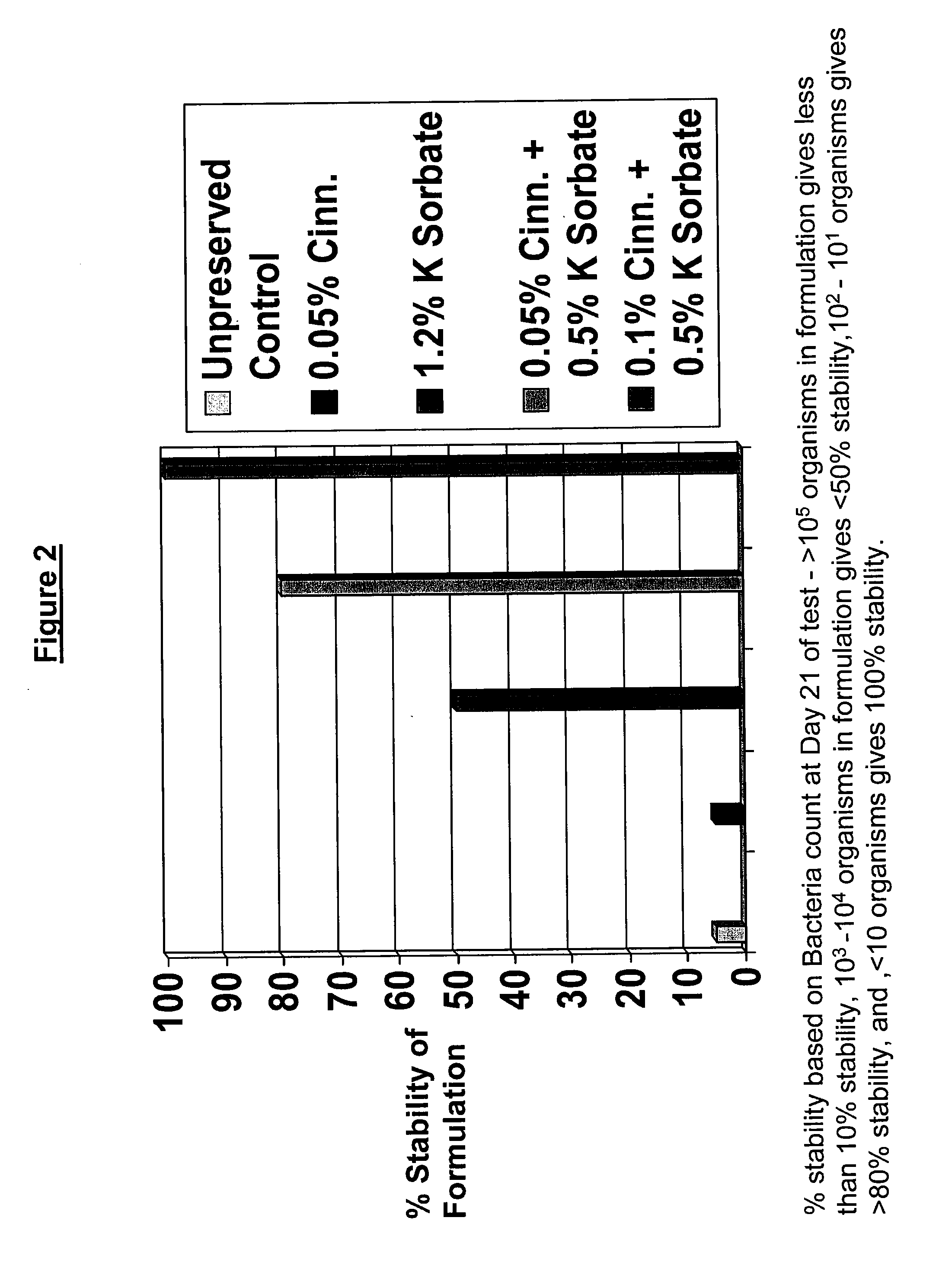Antimicrobial compositions
a technology of compositions and antimicrobials, applied in the field of antimicrobial compositions, can solve the problems of low antimicrobial effect, high cost, and ineffectiveness of natural products, and achieve the effect of only and not effective against gram negative bacteria or fungi
- Summary
- Abstract
- Description
- Claims
- Application Information
AI Technical Summary
Benefits of technology
Problems solved by technology
Method used
Image
Examples
example 1
[0081]Each anionic shampoo sample in FIGS. 1-3 were tested as follows. A standardized mixed bacterial solution was prepared according to the following procedure. 3 agar stabs of S. aureus (ATCC #6538), P. aeruginosa (ATCC #9027), and E. coli (ATCC #8739) were separately incubated at about 35 EC for about 24 hours. Each stab was then washed with 3 mL of sterile 0.85% saline solution. The washes of the 3 stabs were pooled together to form an organism mixture. The absorbance of the organism mixture at 530 nm was adjusted to about 1.00 by adding saline. The spectrometer was calibrated with a saline blank. A 5 mL aliquot of the organism mixture was mixed together to produce the standardized mixed bacterial solution. Then, 40 g of each shampoo sample was inoculated with 0.2 mL of the standardized mixed bacterial solution and mixed. 1 g of the mixture was added to a sterile 20×150 mm screw cap test tube.
[0082]9 mL of sterile D / E neutralizer broth was added to the test tube and mixed to for...
example 2
[0086]Each anionic shampoo sample in FIGS. 4-7 were tested as follows. A standard mixed bacterial solution was prepared according to the following procedure. 2 agar slants of Candida albicans and 4 agar slants of Aspergillus niger were separately incubated at about 25 EC for about 48 hours and 7 days, respectively. Each slant was washed with 3 mL of sterile 0.85% saline solution, collected and macerated in a tissue grinder. Sufficient amounts of 0.85% saline solution were added to each slant to obtain a visual count under a microscope with a Neubauer Hemocytometer of each innoculum of C. albicans and A. niger. Equal volumes of each standardized innoculum of C. albicans and A. niger were mixed together to form the standardized mixed fungal solution.
[0087]40 g of each shampoo sample was inoculated with 0.4 mL of the standardized mixed fungal solution and mixed. 1 g of the mixture was added to a sterile 20×150 mm screw cap test tube.
[0088]9 mL of sterile D / E neutralizer broth was added...
example 3
[0091]The procedure described in Example 1 was repeated with the preservative formulations set forth in Table 1 below. The pH of the shampoo was adjusted to 6.5. The results are also shown in Table 1.
TABLE 1Day 0Day 7Day 14Day 28Preservative Formulationcfu / g.cfu / g.cfu / g.cfu / g.0.3% w / w of a mixture1-3 × 106containing 75%potassium sorbate and25% sodiumerythorbate0.3% w / w of a mixture1-3 × 106containing 75% sodiumbenzoate and 25%sodium erythorbate0.45% w / w sodium1-3 × 106>3 × 106>3 × 106>3 × 106erythorbate0.45% w / w sodium1-3 × 106 1 × 105 7 × 105benzoate0.45% w / w potassium1-3 × 106 1 × 105 6 × 104N.D.sorbateUnpreserved Shampoo1-3 × 106>3 × 106>3 × 106>3 × 106
[0092]From Table 1, synergism for (1) a 0.3% dilution of potassium sorbate (75%) and sodium erythorbate (25%) and (2) a 0.3% dilution of sodium benzoate (75%) and sodium erythorbate (25%) against mixed bacteria in shampoo was calculated by the method described in C. E. Kull et al., “Mixtures of Quaternary Ammonium Compounds and Lon...
PUM
| Property | Measurement | Unit |
|---|---|---|
| w/w | aaaaa | aaaaa |
| pH | aaaaa | aaaaa |
| sorbic acid | aaaaa | aaaaa |
Abstract
Description
Claims
Application Information
 Login to View More
Login to View More - R&D
- Intellectual Property
- Life Sciences
- Materials
- Tech Scout
- Unparalleled Data Quality
- Higher Quality Content
- 60% Fewer Hallucinations
Browse by: Latest US Patents, China's latest patents, Technical Efficacy Thesaurus, Application Domain, Technology Topic, Popular Technical Reports.
© 2025 PatSnap. All rights reserved.Legal|Privacy policy|Modern Slavery Act Transparency Statement|Sitemap|About US| Contact US: help@patsnap.com



